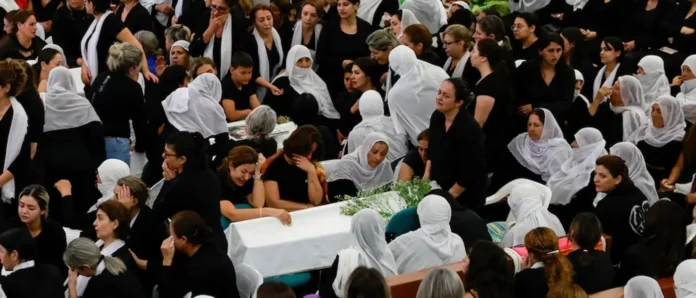Majdal Shams, Golan Heights – July 29, 2024 – In a tragic incident that has reverberated around the world, a rocket attack on a soccer field in the Druze village of Majdal Shams in the Israeli-occupied Golan Heights claimed the lives of 12 children and teenagers on Saturday.
The attack, which Israel has attributed to the Iranian-backed militant group Hezbollah, has triggered a wave of international condemnation and raised fears of a potential escalation of violence in the region.
The Attack and Immediate Aftermath
Israeli military spokesman Daniel Hagari stated on Saturday that the rocket used in the deadly assault was an Iranian-made Falaq-1, launched by Hezbollah from Lebanon.
The attack has left the community of Majdal Shams in deep mourning, as thousands gathered for the funeral of the young victims on Sunday.
The emotional funeral procession saw weeping men in traditional attire carrying ten white-covered caskets through the crowded streets, while women in black abayas laid flowers on the caskets and mourners held large photos of the deceased children.
Fadi Mahmud, a 48-year-old resident, described the incident as a significant loss for the close-knit community.
“It was the first time Majdal Shams had experienced such a loss during the war,” he said in an interview with AFP. “Our community is very close-knit. These children are like children of everybody in the village.”
Iran’s Denial and International Reactions
In response to the accusations, Iran’s Foreign Ministry spokesman Nasser Kanaani dismissed Israel’s claims, stating, “Israel’s statements will not be heeded by others.” Kanaani did not clarify whether he was denying the use of an Iranian rocket in the attack or the involvement of Hezbollah.
The White House swiftly condemned the attack, directly blaming Hezbollah. “It was their rocket, and launched from an area they control,” a statement from the White House read. The U.S. government has been in discussions with Israeli and Lebanese officials since the attack, which it described as “horrific.”
U.S. Secretary of State Antony Blinken, speaking at a press conference in Tokyo, emphasized Hezbollah’s likely involvement and reiterated Israel’s right to self-defense.
“There is no justification for terrorism, period, and every indication is that indeed the rockets were from or the rocket was from Hezbollah. We stand by Israel’s right to defend its citizens from terrorist attacks,” Blinken said, expressing condolences for the loss of life.
The Broader Context
Hezbollah, a militant group established by Iran in Lebanon in the early 1980s, has long been a significant player in the region’s conflicts.
The U.S. government reported in 2018 that Iran provides Hezbollah with an estimated $700 million annually, bolstering its substantial military capabilities, which include an arsenal of roughly 150,000 missiles and rockets aimed at Israel.
Hezbollah’s leader, Hassan Nasrallah, has publicly acknowledged Iran as the source of the group’s funding. The deadly attack has stoked fears of a full-fledged war between Israel and Hezbollah.
In response to the heightened tensions, Lebanon’s Middle East Airlines has delayed some of its Beirut flight arrivals, and several European countries have advised their citizens to leave Lebanon.
Analysis and Predictions
Despite the escalating rhetoric, Mohammad Ghaedi, a lecturer in international relations at George Washington University, believes a full-scale war between Israel and Hezbollah is unlikely due to the prohibitive costs involved.
“Despite the threats being made, my analysis is that we are far from a full-scale war between Israel and Hezbollah for several reasons,” Ghaedi told Iran International.
He cited the financial burden of such a conflict, recalling that the 2006 war between Israel and Lebanon cost around three and a half billion dollars.
“Today, an attack on Hezbollah could cost more than 50 billion dollars. Additionally, Hezbollah’s enhanced capabilities, including precision missiles, position them to retaliate effectively against Israeli targets.”
According to security sources, Hezbollah has preemptively evacuated several key sites in southern Lebanon and the eastern Bekaa Valley in anticipation of a potential Israeli attack.
Ghaedi believes that Israel will likely conduct limited strikes in response to Hezbollah, aiming to resolve political differences within Israel and seek international condemnation of Hezbollah.
Ghaedi pointed to the rocket used in the attack, allegedly an Iranian-made Falaq, as a central point of tension. “If confirmed, it could prompt small-scale Israeli responses within Iran, following Naftali Bennett’s ‘thousand cuts’ strategy against the Islamic Republic.”
Global Implications
The conflict has the potential to involve other powers, including the United States and Iran. However, Ghaedi finds it unlikely that Iran-backed forces in Iraq and Syria will enter a conflict under current circumstances.
The tragic loss of life in Majdal Shams has united the international community in condemnation of the attack and in support of Israel’s right to defend itself.
As the situation develops, the world watches closely, hoping for de-escalation and a resolution that prevents further loss of innocent lives.
Conclusion
The rocket attack on Majdal Shams serves as a grim reminder of the ongoing volatility in the Middle East.
As Israel vows to respond to the suspected Hezbollah attack, the international community must navigate the delicate balance of supporting Israel’s right to self-defense while advocating for measures that prevent further escalation.
The future of the region remains uncertain, but the shared hope is for peace and stability to prevail amidst the turmoil.

